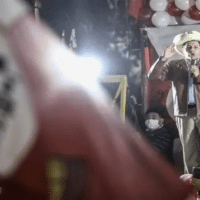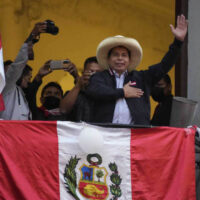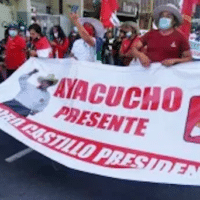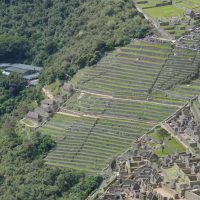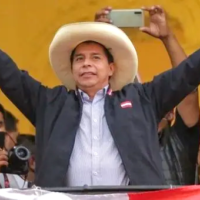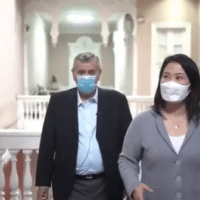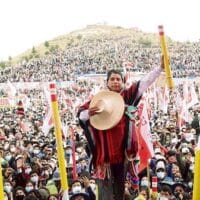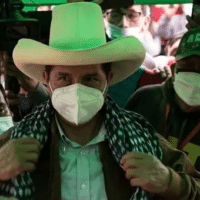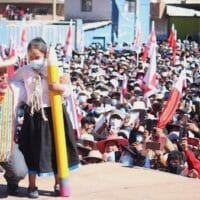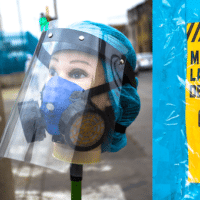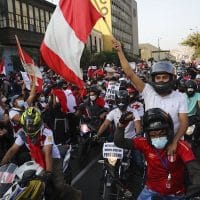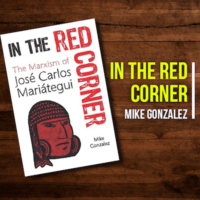-
Peru to officially declare Pedro Castillo as the new President
Electoral authorities concluded an electoral review in which the leftist.
-
There’s a dirty tricks campaign underway in Peru to deny the Left’s presidential victory
The campaign to overturn Peru’s presidential election results is one of “unconventional warfare.”
-
Is Peru on the verge of a Coup?
One month after holding the run-off election, Peru still has no President-elect. The winning candidate, leftist Pedro Castillo, hasn’t assumed the country’s leadership yet because the Peruvian right-wing insists that widespread election fraud has taken place, although justice authorities say otherwise.
-
The imminent coup in Peru
Legal maneuvers and delays, presented by the far-right, are pushing Peru closer to a coup with each passing day. It’s been 20 days since Peru’s June 6th election, and the authorities have not yet proclaimed the winner, Pedro Castillo.
-
Peru at the brink of civil war? The uprising of the dispossessed
This is the moment for the vast majority of Peruvians that they have been waiting for; those Peruvians that have always been considered as “non-people” by the oligarchy.
-
Breaking the Stasis: The Left writes a new chapter in Peru
On June 10, 2021, the National Office of Electoral Processes (ONPE) published the results of the second round of elections to elect the new president of Peru, with the winner being Pedro Castillo, the candidate for the leftist party Peru Libre (PL).
-
The coup that is taking place in Peru
While by all accounts, Pedro Castillo won the second round presidential elections, his adversary has refused to concede, and many fear that tensions could escalate with the help of Peru’s loyal right and the newly appointed U.S. ambassador.
-
Pedro Castillo wins presidential elections in Peru, Keiko Fujimori rejects the results
With 99.998% of the ballots counted, left-wing candidate Pedro Castillo has secured 50.204% of the votes, while far-right Keiko Fujimori has obtained 49.796% of the votes. Yesterday, Fujimori requested the election authorities to annul the results from 802 polling stations nationwide
-
Peru: Castillo has 113,000 vote lead over Fujimori
He has received greetings from some Latin American governments for the favorable result of the presidential elections.
-
Understanding Peru’s elections from the Peasant Patrols to Fujimorism
500 years of colonial history, 200 years of life as a republic, and 40 years of experience of the rural and urban peasant patrols movement, to understand a subject and a process that come from afar.
-
The class character of the expansion of COVID-19: The case of Peru’s Capital City Lima
At the end of December 2019, the world was notified about the existence of a new coronavirus in the city of Wuhan in China. This virus, SARS-COV-2 (COVID-19), rapidly spread and was declared a pandemic by the World Health Organization (WHO) on 11 March 2020.
-
Peruvian government falls after two killed in anti-impeachment protests
Less than one week after being sworn in as successor to Peruvian President Martín Vizcarra, impeached in what amounted to a parliamentary coup, the former president of the Congress, Manuel Merino, was forced to resign Sunday.
-
Peru’s COVID-19 crisis
Strikes and demonstrations are on the rise across Peru, as the government’s COVID-19 response has resulted in the country bearing the highest per capita infection rate and death toll in the world.
-
In the red corner
Mike Gonzales gives a fascinating outline of the subject of his forthcoming book ‘In the red corner: the Marxism of Jose Carlos Mariátegui’, detailing the life and politics of an important Marxist who shaped the early working class movement in Peru.
-
Dossier 14: Brazil’s Amazon—the wealth of the earth generates the poverty of humankind
The destruction of the Amazon has serious consequences not only for Brazil, but for all of Latin America—and the world.
-
Marta Harnecker on New Paths Toward 21st Century Socialism
Introduction by Richard Fidler Among the many panels and plenaries at the Conference of the Society for Socialist Studies, which met in Ottawa June 2-5, was a Book Launch for Marta Harnecker’s latest English-language book, A World to Build: New Paths toward Twenty-First Century Socialism (translated by Federico Fuentes), Monthly Review Press. The featured speaker […]
-
Marxism, Ecological Civilization, and China
China’s leadership has called in recent years for the creation of a new “ecological civilization.” Some have viewed this as a departure from Marxism and a concession to Western-style “ecological modernization.” However, embedded in classical Marxism, as represented by the work of Karl Marx and Frederick Engels, was a powerful ecological critique. Marx explicitly defined […]
-
Anatomy of a Hatchet Job: Regarding Women Cross DMZ in CNN’s Situation Room
A television news program opens with a clip of marching soldiers, an obligatory image when the subject is North Korea. A voiceover intones: “A bold, ambitious plan apparently sanctioned by Kim Jong Un. Is he in league with the women’s group to promote peace between North and South Korea?” The program in question is the […]
-
Challenging Harper’s Imperialist Agenda
It has become commonplace to observe that the Conservative government of Stephen Harper has been re-making the symbols and practices of the Canadian state. Canada, in this view, was once the social democratic heartland of North America. But under Harper, Canada has been transformed into a hyper-regime of neoliberal market fundamentalism. Nowhere, it is argued, […]
-
Preface to the Indian Edition of Harry E. Vanden and Marc Becker’s José Carlos Mariátegui: An Anthology
Upon the release of the Indian edition of Harry E. Vanden and Marc Becker’s José Carlos Mariátegui: An Anthology (Kharagpur: Cornerstone Publications, 2013; originally New York: Monthly Review Press, 2011), Vanden is in India on a lecture tour to spread the word about the ideas of José Carlos Mariátegui. On this occasion, we are publishing […]

